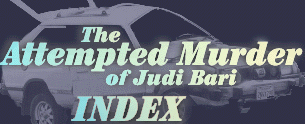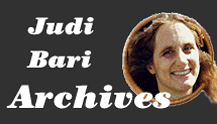

 |
 |
"The bombing absolutely ruined my life. It ruined me physically. I don't know what it is going to be like to grow old with these injuries; I already know what it feels like to be eighty. And it has ruined my opportunities -- what I can do. I have to focus on this no matter how hard it is to do. It's very much changed who I am and what I can do with my life.. . . And it's hard to contemplate. Why did this happen to me? I really agree with Bruce Anderson. I don't think I was enough of a threat to the power structure to merit this kind of action. I think the attack on me was way out of scale to the real threat that I posed to the timber industry or to the capitalist system. And I've had to try to explain to myself: why did this happen?
-- Judi Bari, from her cabin, January 1995
Part I
![]() "The Bombing Didn't Happen in a Vacuum"
"The Bombing Didn't Happen in a Vacuum"
![]() "My Next Memory Was of the Bomb Blowing up"
"My Next Memory Was of the Bomb Blowing up"
![]() "They Asked Who Did it, and I Said 'Timber'"
"They Asked Who Did it, and I Said 'Timber'"
![]() Unconcious and Under Arrest
Unconcious and Under Arrest
![]() Confusion, Courage in Mendocino
Confusion, Courage in Mendocino
![]() FBI Rushes to the Scene
FBI Rushes to the Scene
![]() The FBI Bomb School Connection
The FBI Bomb School Connection
Part II
![]() The Lord's Avenger
The Lord's Avenger
![]() Signs of Conspiracy
Signs of Conspiracy
![]() "The FBI Should Find the Bomber and Fire Him"
"The FBI Should Find the Bomber and Fire Him"
![]() Thrust Into the Spotlight as Icon Activist
Thrust Into the Spotlight as Icon Activist
![]() News Blackout at the Press Democrat
News Blackout at the Press Democrat
Part III
![]() How the Bombing Helped the FBI
How the Bombing Helped the FBI
![]() Targeting Earth First!
Targeting Earth First!
![]() Earth First! Under FBI Attack
Earth First! Under FBI Attack
![]() The FBI's Single-Minded Pursuit
The FBI's Single-Minded Pursuit
Who bombed Judi Bari?
"This is not a Nancy Drew mystery... [but] often it feels like one," wrote Beth Bosk two years ago. Bosk is the editor of New Settler Interview, a monthly newsprint magazine distributed from Mendocino County to Southern Oregon. In January, 1995 she interviewed Bari about the bombing and its aftermath. Although some new information has surfaced in the two years since, this remarkable interview remains Judi Bari's definitive account of these events.
Although Bosk and Bari were sometimes opponents on activism politics, Judi appreciated Bosk's evenhanded and professional presentation of an earlier interview. Says Bosk, "I've known her for many years, and had interviewed her just before the bombing. That first interview in New Settler was passed around afterwards because it showed that she and Earth First! weren't eco-terrorists.
"Having that issue available was important. Judi was having an awful time getting her story out to the press. Not that anyone really believed that she had made the bomb, they didn't know what else was going on, such as the attacks on Judi and Earth First!"
Bosk sold out of the issue with this interview and had to order an unprecedented second printing. This issue remains in great demand. "I feel that this New Settler interview broke the dam in telling Judi's story." Bosk says. "Since then, coverage has taken off -- just this August, there was a major feature on the case in Harpers' Bazaar."
New Settler Interview was founded by Bosk in January 1985, after the north coast's Grapevine alternative newspaper became commercialized. "I just started going around and interviewing interesting people," Bosk says. "My goal was chronicling natural builders and forest land activists. The community responded -- it was economically viable from the start."
Of her 1995 interview with Judi Bari, Bosk recalls the scene in Bari's cabin. "When you want a good story, you have to pay attention. But Judi always has guys hanging around and the telephone ringing; there are people at her door wanting bits and pieces of her because she's one of the most dynamic activists of our times. I threw them all out. It was two hours of just 'women's talk.'"
This presentation of the interview is broken into three parts and 16 sections. These divisions are artificial, and provided only to make it easier to read online. The many threads -- Judi's description of the bombing, its effects on her body and spirit, her pursuit of the bomber, the FBI, the present and past of Earth First! -- weave into a seamless whole.
Bosk wrote in an afterword to the original article:
The most poignant photograph is taken at dawn: July 1991, Redwood Summer II. Twenty-some demonstrators, including a careworn Judi Bari and Darryl Cherney (Darryl hefting his guitar, Judi still very crippled, her right Birkenstock turned in) gather after burying a Pinto in a logging road somewhere in Mendocino County. They are prepared for the worst, having had at least one demonstrator beaten up at every demo for a week. Two of the men carry a huge banner: "Let's Talk" it reads. A logger leans on the back of his pick-up looking. You can see the roll bar, you can not see his expression. On the back of the dim picture someone has scrawled: "This one was peaceful."Who bombed Judi Bari? There is more to this story, of course, more evidence, firmer links. Judi and I meet two weeks after the interview to pore over photographs, check spellings. Judi waits for me to turn off my tape recorder; haltingly, she spills out a waterfall of new information: the most telling connected to materials used in the making of the two bombs; a witness -- found as recently as the previous week; undisclosed background information on one of the men present at bomb school. I am astounded. I detect her fear. I feel it too. There is a level of fright she must wrestle before she can make the new stuff public.
The New Settler interview begins:
NEW SETTLER: The last my readers know of you with regard to the bombing, you are in an Oakland hospital, near comatose. Outside, the FBI and the Oakland police are accusing you of the act of transporting the bomb that blew up your car as you were careening down a street in Oakland. I'd like you to begin with your recollection of the day you were bombed: why you were in Oakland?
JUDI: I'm going to start the day before in Willits, because I think it is more logical that way...
 | ||
Albion Monitor January 13, 1997 (http://www.monitor.net/monitor)
